#this is a fucking essay
Note
Your brain is literally gynormous. Do you think Damian's and Dick's relationship is paternal? Because, as someone who has actually had to raise their sibling (do not recommend) it looks more like a guy that had too much in his plate trying to be the best caregiver he could, but not really being a parent, if that makes sense. I feel like the idea of him wanting to adopt him feels like kind of a retcon, couldn't really see it in the og run. But of course, it could be because it's not exactly the same as my experience (abusive father, incapable mother, yknow the drill). What do you think? All your posts are so good.
Also while you're at it, what do you think of Dick as a parent? Some elseworlds have played with the concept, and main continuity did something too with Olivia but T*m Tayl*r fucked that up too. I also wonder how Damian would be as a dad, but I don't think I've ever seen any stories with it.
omg anon thank you and thank you for asking!! this is literally one of my favorite topics!! i was thinking about making a post on this and now you gave me the excuse for it!!
Long story short, I don't think that “parental” is a binary thing. I mean, I know several bio-parents who are just guys with too much on their plates, trying to be the best they can, you know? And people can see parent figures in all kinds of relationships that aren’t blood or traditional moms/dads, especially with people who didn't know each other from birth. There are a million ways to be parented, and a million ways to act as a parent.
The way I think about it is, is Dick Damain's John Grayson? No, I don't think so.
But is Dick Damian's Bruce Wayne? Yes. Totally. Absolutely.
More under the cut bc I have a lot of thoughts.
I think to talk about Dick and Damian, we have to start with Dick and Bruce. So much about Dick and Damian is a reflection of the original Dynamic Duo, and I think that's very much the case with this element as well. From the start of their very long comic history, Dick and Bruce have been dancing around their relationship. We get early comics that say they're "like" father and son, we have Bruce saying he couldn't care about Dick more than if he was Bruce's son, but we also have places where they call each other their best friends, where they act more like brothers, etc etc.
When it comes to who our parents are, I think there is the responsibility, and the result. Certain people have the responsibility, the duty, to be our parents, and sometimes (because death or illness or being shitty people), they aren't able to meet those responsibilities. That never removes the responsibility; they don't stop being the parent. But they aren't able to create the result of us becoming good stable adults. That's where other people can step in, where the parental figure appears, and those are the people that we actually point to when we say "they made me the person I am today."
In fandom, we see a lot of Dick not wanting Bruce to replace his father, of him asking not to be adopted. I think this is a fine characterization that works with who Dick is, but Bruce is actually the one to say that he is not going to replace Dick's father. He says it completely unprompted, too. This is withholding the responsibility of being Dick's parent from Bruce, keeping him at a distance and reserving it as an honor for someone who can't hold it anymore, even as Bruce demands responsibility for literally everything else about Dick.
And I think that it's very telling of what Bruce's idea of a father is. The thing about having a dead parent at a young age is that the person of your parents is still tangled in the role of parent in your life; Mom is mom, not Martha, and because she's dead, the image of both Martha and "mom" is frozen. For Bruce, the relationship of father and son is frozen in the relationship of specifically his father and him. Of course Bruce is not Dick's father; Bruce himself is so different from what his conception of a father is. And as a fellow son, for Bruce, someone who just got back from 7 years abroad studying to be Batman, for whom the nearly 20 year old wound is still fresh, the idea of even wanting another father doesn't make sense, particularly for a boy that Bruce identifies with so hard that he becomes the third person ever to know who Batman is.
This looming memory is even worse when it's Dick's turn to be Batman. While Bruce looks at Dick and sees the memory of his own loss, the shadow of his own grief, Dick is looking at Damian and seeing Bruce. Dick knows very well who Damian lost; Dick is grieving what Damian lost more than Damian is. Bruce couldn't conceive of replacing a father, but Dick is struggling to imagining himself replacing Bruce at his job, much less who he was in his personal relationships.
But even if Damian isn't Dick's responsibility, Dick doesn't hesitate to care about Damian's future. "Who's going to save him if we don't?" At the start of the DickBats era, Dick isn't looking at Damian as a family member, really. He's looking at Damian as a victim, abet a very involved, very dangerous one. It's how Bruce looked at Dick too, before he had any reason to know that this kid would become something more to him. But, like Bruce, what Dick does to save Damian is bring him into the thing that is most precious to him; Batman. The mission. Saving people. A way to live in the world.
I know saying someone is the Batman to their Robin is like, a joke at this point. Something unbelievably cheesy. But you google "iconic duos" and Batman and Robin are one of the first responses. There's a reason for the joke. So imagine you are Robin, and your Batman is dead. And you have to go and find a new partner. Dick making Damian his Robin is heavy, just as heavy to me as adoption papers. Bruce made Dick his partner without any idea of what that meant. Dick, and the audience, had 70 years of expectation on what Dick and Damian could be. Dick making Damian Robin was a very specific claim, far stronger imo than just claiming him as a son would have been.
Because, to be honest (and speak to your other question), I don't think Dick thinks a lot about being a parent. I don't really think it's that important to him. Dick is a leader, a mentor, he deals with a ton of teenagers and kids through his vigilante work, he goes to Tim's sidekick parent's meetings and takes Jason skiing and more than that, he's also young. He's in his 20s. He should be at the club. I think he probably thinks he'll have kids in an abstract way, but it's not something he's looking for, consciously or unconsciously. He's not searching for connection, or to fix his mistakes or his past, the things that lead Bruce to adopting sidekicks. He'd be a great dad, and I think we see him being pretty good with his Elseworlds kids, but Dick is a very practical person, and him taking a kid in (vs finding somewhere else they can go) is not really the practical choice.
Except for one kid. There's just been one kid with legitimately no where else to go, where Dick is truly the only option, because going home meant only bad things for him. Dick made Damian part of his family in the ways that mattered to them both in that moment. With their lives, adoption doesn't really make a huge material difference on custody (if Damian wanted to leave, Dick couldn't have stopped him; Damian has access to basically unlimited money and can feed and clothe and wash himself. and possibly already has a phd.), and Dick wanted Damian to choose, anyway. If I recall correctly, Dick says he didn't think about taking Damian with him until Bruce comes back. He thought about taking Damian with him, thought that Damian might be better with Dick (his partner!!!!) than even with Bruce, his dad, the person Dick loves so much, only in the face of them being separated.
Meanwhile Damian, for all his blustering about how Dick needs to "earn" his respect, warms up to Dick startlingly quickly. For Damian, who had never known a father, who in his initial run hadn't even known his mother for more than two years, whose other male family is Ra’s al Ghul, his father is Batman. Even in Tomasi's kinder depiction of Damian's childhood, Damian only knows the Bat. And when he meets Bruce, the first thing he expresses is disappointment. Bruce the man is underwhelming and then goes and dies. So much for the mythic hero!
And then he meets Dick. Who manages to teach Damian something, who doesn't discount his skills even when he's wrong. Who proves that he is better at being Batman than Damian, and shows that he wants Damian around. And, even more importantly, who doesn't die. Dick is stable in a world constantly in flux. Damian screws up a lot in that run, and he leaves for long stretches of it, but Dick is always there when he gets back. There's no blame here, but the truth is that Dick is the one who stays.
Bruce was Damian's father, but what does that mean to someone whose never met a father at all? Bruce might have tried to connect with Damian before he died, but he doesn’t do it in a way that works. He doesn’t give Damian trust, he doesn’t encourage him in the ways Damian finds important…the first person to do that is Dick. Dick gives Damian responsibility, makes him part of the team. It could be argued that Damian didn’t deserve it, but we’re not talking about deserving. We’re talking about what worked. It sounds like as good an idea as making a tiny 8 year old acrobat a sidekick, but it undeniably worked for both Damian and Dick. Does that mean that either of these relationships were parental in the way that we think of it in the real world, in the way that a child psychologist would say is good and healthy? I have no idea. But they are the most parental in the absence of any other parents, and I think that means a lot.
Unfortunately, we don't get to actually see the dissolution of Dick and Damian's partnership. DC conveniently skips over showing us Bruce coming back and Dick becoming Nightwing again; preNew 52, Dick is still Batman with Damian even when Bruce returns, and in the New 52, he's been Batman "Before" and we don't really see the end, just a vague aftermath. But if it did take that kind of change to make them realize their relationship had a flavor of "parent and child", had the makings of something like a father and son, well, they'd just be following in the original Batman's footprints.
#asks#dick grayson#damian wayne#bruce wayne#this is a fucking essay#batman meta#And I didn't even manage to talk about John#Sorry John#I think there is the more traditional caregiver side of parenthood#the part that makes sure the kids are fed and dressed and ready for school#but the magic of comics is that none of the bat characters really need that and damian in particular is not receptive to it#They kind of regress Damian to it a bit after the supersons era#but he is extremely assured while Dick is batman#he doesn't need a parent in the caregiver way he need a parent in the believes in you and gives you somewhere to call home way#it just turns out that its really hard to have someone love you and watch out for you and get super invested in your development#and not think of them in some kind of fond paternal way#also i may need to make a real post about dick and children because i dont know if i was really coherent here lol#also if there are any issues that show something i missed lmk#i have definitely not read everything
45 notes
·
View notes
Note
What’s your thoughts on Elain? 👀
OMG I think I could go on for hours tbh!!! This is such an interesting topic for me because I get such strong feelings and I am not sure why!!!! This is gonna be a whole essay, so you totally do not need to read all of this!
I honestly do not like Elain! I don’t like her character, I DONT like her and Az together. and I do NOT like the way she treats Lucien. I have talked to my friends about this and I just cannot get over the fact that everyone in the IC treats Elain like a flower. She was def traumatized, but I feel like a lot of the IC (Rhys) shifts blame onto Nesta about how Feyre needed to hunt for their family. Elain didn’t do much to help Feyre, and from what I remember, was extremely close with Nesta before being introduced to the IC. I don’t think she was held accountable like she should have been.
I also think she lacks any character tbh, there is just not enough about her besides she likes gardening and is a see’er (or however you spell it)
AND, I absolutely HATE that she treats Lucien like SHIT and then puts Azriel on a pedestal. I feel like Lucien has been through so much and I just feel so bad for him, like my heart aches.
THE EXTRA CHAPTER FROM ACOSF HAD ME FUCKING SICK!!!! I FRL WAS SICK TO MY STOMACH!!! OMG AND I THINK THE SOLSTICE SCENE IN ACOSF HAD ME SICK TOO!!!!! Frl she just brushed Lucien off so easily, BUT THEN in the extra chapter, was thirsting after Azriel so hard. Especially when Lucien was upstairs sleeping or probably upset about Elain rejecting his gift like last solstice!!!
I read this one fanfic that was Lucien speaking to Elain and he goes, “You didn’t even give me the chance,” and idk who wrote it, but I totally agree.
Maybe I say this out of jealousy, but I truly do not like Elain and Az together. I think Elucien should be endgame, and I think if SJM gave them the chance, they could be really really good together. I personally think that Az and Gwyn are meant to be.
Anyway, sorry for this essay!!! But I love talking about this and you totally do not need to read this whole thing. Also if you don’t agree with me, that is totally okay!!!! I am just a jealous hoe who wants Az for myself!!!!
#rose rambles#rose answers#this is a fucking essay#i am so sorry#i have such strong feelings#lowkey#i think she has potential but idk#like i think i might need to block the tag cuz i get too heated#gwynriel for life#actually azriel x me for life#azriel is mine#i pray that azriel stays awake at night thinking of me#even tho he doesnt exist
36 notes
·
View notes
Note
You've got me interested in Dragon Age with all the content you post or reblog, but I've been a bit curious about the actual gameplay itself. Can you tell me about some of your favorite portions from the game series?
First of all I'm flattered you decided to come to me, the backwater dumbass that lives in a ramshackle hut and yells at the sky about this godforsaken franchise. There are probably far better people to ask this question. I hope you are okay. Second, I meant to get around to answering this a few days ago, I Forgor. Third, buckle up, it's Dinosaur Post all over again but extremely long.
I'm going to split this up into the actual, technical gameplay bits and the other stuff because both of these play a role in why I like or dislike certain aspects of all three games. Also, I will be including some things I don't like or didn't work for me, but that's a small portion. I'll label each part so you can skip to whichever section.
To preface: Dragon Age: Origins was THE game (along with Skyrim) that got me away from MMOs and into single-player RPG games. DAO will always be special to me because of that and thus I have some bias towards it. Because I can't do anything in short-form, this is long as hell, and contains my thoughts on each game.
Before we begin: GIANT DISCLAIMER that these are my opinions, not fact. I love these games despite their many flaws, and if I didn't want them to be better, I would not be critical of them.
I will not be going over any of the DLCs because frankly there are a lot of them, but in my opinion, all the DLCs for all the games are excellent additions to the base games they belong to.
The Technical Gameplay Stuff
General:
All of the combat in Dragon Age plays out something like this: You have your party of up to 4 consisting of your Player Character (PC) and three other companions who you recruit at different points in the story. You can choose to fill out your party (meaning you have the max of 4) or you can go solo, bring only one companion, etc. You control one character at a time while the game controls the rest, but you can freely swap between characters, pause mid-combat, move your camera around the battle, and give direct commands to individual party members that will execute when unpaused. Combat is persistent, not turn-based, and will only end if all enemies are killed or the player gets far enough away to disengage battle.
Each game also has their own 'tactics' system that dictates what other members of your party do in certain situations when not controlled by you
Dragon Age has a condensed classical RPG class setup consisting of Warriors, Mages and Rogues. There are subclasses of these (known as Specializations, which unlock stat bonuses, new skills and passives). Each class has unique advantages that encourage you to have at least one of each in your party. This is especially true of Inquisition with obstacles which can only be cleared by certain classes.
Furthermore, Origins was a little more flexible in its class choices because a: weapons and armor were not restricted by class, but by stat investments and b: warriors have access to all weapon talents (two-handed, sword and shield, dual wield and bow) while rogues only have talents for dual wield and bow.
Following Origins, weapons and armor types are restricted by class.
Dragon Age: Origins/Awakening:
DAO's combat is fairly slow and a bit clunky and perhaps dated, but I think that's the charm of it. As far as how interactive the combat is, DAO is the least interactive of the three games. That does not mean you can let the battles play out on their own, especially if you're playing harder difficulties. You will still need to do some tactical positioning, switching characters, using items, etc. But DAO does not require you to hold down a button to perform basic attacks on your controlled character. You simply select your target and start attacking it, and activate skills as you see fit. What i mean by 'least interactive' is that, compared to the other two games, you'll be doing less actions per minute most of the time.
For me, the typical combat gameplay loop for Origins is something like this:
combat starts, pause game, move party as necessary, unpause
mage controller AOE paralyze largest cluster and/or stunlock the most dangerous enemy
warriors to largest cluster > tank AOE taunt, melee DPS AOE/Stun
ranged DPS target ranged enemies; intercept with warriors/melee characters as necessary; dual wield rogues with max stealth can also be sent to kill enemies in the back, or flank at largest cluster and AOE/stun spam
pause to adjust as necessary (heal, use items, reapply crowd control)
Your options early in the game will be limited, as AOE taunt and mass paralyze require a few levelups and stat investments to unlock. In the early game, you'll be using single-target stuns, knockbacks, etc to keep the battle under control. Luckily, each class has access to a stun early on. The Mabari hound is also great to bring along for an early-game AOE stun if you're struggling.
You'll need to carefully choose which skill trees you want to invest in, particularly for your primary tank and a controller-oriented mage (highly recommend for the utility), because there isn't an easy way to reset skills.
Also, many mage skills have Friendly Fire, particularly with AOE damaging abilities. Be cautious with these.
The tactics system in Origins/Awakening is, in my opinion, the best in the series. It's very in-depth, you can have multiple loadouts and change them as needed, iirc you can switch them on the fly through the menu, and generally make your life easier, especially if you just want to stick to controlling one or two characters.
These settings operate largely on a 'if X condition, then Y' set of logic. For example, when setting tactics for a two-handed warrior, you can have, "If surrounded by X number of enemies, use AOE ability,' or 'If Controlled Character is targeted by EnemyClass/DamageType, do X Action.' On harder difficulties, I wouldn't solely rely on tactics but it is very, very useful.
Origins also had craftable and placable traps, flasks and poisons that largely got baked into skills or potion crafting in the other two games, which is neat and fun because you could do stupid shit like this to oneshot a fucking dragon. Also Muh Roleplay.
TLDR: I like Origin's combat loop because of how simple, but effective it is. It's influenced by DnD-type strategy and is complex enough that I have to think about what I'm doing, I can't just bumrush through, but not so difficult that it feels impossible or unfun.
Dragon Age 2:
DA2's combat departs from Origins somewhat; you still don't have to hold down an attack button for basic attacks, but the combat, in my opinion, feels much faster paced, more akin to an ARPG. In comparison to DAO, I am constantly pausing the fight to move targets or use my next ability. There are also far more enemies per fight than Origins, as they come in waves instead of all at once. They typically have lower health, but their numbers combined with the amount of waves can make some fights challenging and a slog. There are, however, a plethora of AOE abilities to assist with this.
I'm not sure about the complexity of DA2's tactics as I don't use it that much and just opt for intense micromanagement during combat, but from memory it does also have some depth. DA2's difficulty scaling is, in my opinion, pretty steep compared to Origins and I prefer for play it at the normal setting. Personally I have the most fun playing as a rogue and flipping around stabbing people and kicking them in the face. Overall, fun, flashy.
Typical loop for combat is something like:
Miasmic Flask largest group > AOE the shit out of that group > Warrior Taunt > heal > repeat
Mostly though, it's a loooot of pausing and unpausing for me personally.
Dragon Age: Inquisition:
Somewhere in the middle of DAO and DA2 with a few extra bells. You can jump now! On keyboard the jump button is spacebar, which happens to be the button that pauses the game in the previous two games. I'll let you imagine how that goes mid-fight. Anyway, the combat for DAI is fairly interactive and now requires you to hold down a button to perform your basic attacks. The game is much more open-world ala Skyrim with different contained regions you can travel to. I hate to say it, but combat outside of boss battles in Inquisition is somewhat boring. It's very pretty thanks to the Frostbite engine, but that's about it.
Additionally, you no longer heal out of combat. Your healing options are also limited. You start the game with a fixed amount of health potions that are shared across your entire party. The potion-sharing is similar to DA2, but there was no max potion cap on DA2. You are limited, always, periodt. You can expand this number through crafting upgrades, as well as healing effectiveness. There are also potions that heal over time with an upgrade that heals in an area around the user, and a grenade that heals in the target area. (idk man don't ask)
There are some skills/ultimates/weapon abilities that give some healing or shielding, but combat is made artificially harder because of this change. In longer missions, there are typically one or more supply caches where you can resupply, however (unless you turn that off in Trials). I'm not saying this is a bad thing, just trying to be thorough. This only becomes a pain in the ass for long fights like bosses or high dragons.
There is a learning curve to Inquisition's combat, which the prologue tests you on (Pride Demon my beloathed). While initially challenging, there is a point at which combat outside of boss battles/high dragons feels trivialized, even on Nightmare. The DLCs, however, bring some punch back to combat and are actually difficult, which is nice. If playing on Nightmare, it is much harder to brute-force your way through, especially if doing it for the first time without the special schematics you obtain from them. I was literally shooketh when I took my endgame Nightmare build through Trespasser the first time and got clapped. (Just to be clear, this is a good thing. I like a little difficulty in my combat, so I play on Nightmare to suffer, but you don't have to.)
Hands down the absolute worst thing about Inquisition's combat, especially if running on Nightmare like I do, is the tactics system. It is hot fucking garbage for Nightmare. It is so far condensed from Origin's tactics that it's laughable. I had to google optimal tactics settings for Nightmare because some DPS character would inevitably stand where the tank was standing and eat an entire dragon's breath and die regularly, no matter how much I micromanaged.
I do, however, very much like most of the skills/specializations in Inquisition, especially for Warriors. Compared to the previous two titles, it is FAR easier to keep everything's attention on the tank and not your squishes (even more so if you have Trespasser DLC). Also, performing cross-class combos feels much more satisfying (and is far easier right out the gate) on Inquisition comparatively. There's nothing like freezing an enemy and having your 2-hander warrior cleave into them for a chunky combo. Big number make brain go unga bunga.
Additionally, it also doesn't take much skillpoint investment to get a decent handle on fights. This is especially true if you have the Trespasser DLC, which adds new upgrades to active abilities. Two taunts can be acquired pretty early (three with Trespasser) and all are relatively low cooldown. Also! If you fucked up your build (or want to respec for something specific/try something new) you can easily reset your points to reinvest them! Keep in mind you can't change your specialization once you've unlocked it though.
The Story Gameplay Stuff
In my opinion, the thing that makes the Dragon Age franchise great is the characters and the relationships experienced with them. The games are as much about their stories as they are about the conflict that brings the characters together. This is the type of thing that makes me stick with this franchise; the characters really make it for me. The characters are well-written, feel unique, and have their own strengths and flaws that make them grounded. There are characters I don't enjoy, but I appreciate them because, again, they are well-written.
DAO and DA2 is very much the flavor of RPG where your choices matter, and this includes both what you choose in the story and with individual characters. You can befriend said characters or you can let your rapport with them get so low that their disposition toward you can change, and they might even leave your party. There are some companions whose dispositions you can change. Known as softening or hardening, this can sway a character's decisions and make them more likely to go along with certain player-made choices.
DA2's Friendship/Rivalry system, in my opinion, a nice middle-ground approval system. Your decisions/interactions will garner approval or rivalry, changing your companion's disposition toward you, but a high-rivalry companion won't abandon you simply for having high rivalry. Rather, the companion will still go along with what your decisions, but there will always be underlying tension. You're also not locked out of romance simply because of high rivalry levels. Honestly, I enjoy some rivalmances more than a high friendship romance, but either way, the system gives you more ways to freely play your character and interact with the cast of companions. Companions in DA2 may leave/become unavailable because of decisions made in the story, but not for approval, which I think is nice.
DAI is also a game about decisions, but doesn't do it as well as DAO or DA2. The first two games do a good job of "show, don't tell" with your impact on the game. Inquisition does a lot more Telling than Showing, which I think is a shame for an RPG with its premise. Regardless, DAI's approval system is back to an Origins-esque style, but your total approval with individual characters is hidden from you. Furthermore, companions will approve or disapprove of major decisions you make regardless if you bring them with you or not (which feels much more realistic to me).
While I feel that Inquisition squandered a lot of the potential it had with its main conflict, it handles its characters, their relationships with the player and other characters very well. In fact, a lot of the Show part of "show don't tell" in Inquisition is displayed through your companions, either literally by changing their tarot cards or their reactions/interactions to you and other characters. As I said before, the characters are what makes the franchise for me, and Inquisition, for all its faults, does its characters exceptionally well. Their backgrounds, motivations and personalities are diverse and complex, and is what makes Inquisition replayable for me.
Each game also features its own protagonist/player character, which is probably my favoritest thing about Origins, specifically. A lot of the replayability for Origins is playing through each origin and/or class combination. Aside from simply adding more ways to roleplay, which is always welcome in my book, each one gives different perceptions to the game's conflict with some interactions specific to your chosen origin. If playing DAO, I highly recommend working your way through each origin.
DA2 technically only has one origin, Hawke. While I personally see Hawke as a more defined character compared to the Warden and Inquisitor, Hawke is still a malleable character, and of course, headcanons are free and cool to have. Anyway, you can play Hawke as any class, and I'd recommend to play through the game at minimum as a rougue/warrior and mage. Given the subject matter of the game, this gives you a different look at the game's conflict.
Inquisition offers more race options once again, but forgoes an origin prologue like DAO. While there is some depth to Inquisition's origins, they're not as complex as DAO's. However, this does lend the player some flexibility to fill in the gaps, if they choose. Why use a canon backstory when you can make your own? That's the fun of RPGs, no? I'd still recommend playing through one or two of the origins, while not quite as impactful as the previous titles, some things change depending on which Inquisitor you choose.
But Dances, what about the other stuff you like?
Maps:
DAO and DA2 have a level/dungeon system (idk what else to call it) that are self-contained areas/sub-areas that you explore. Each area is initially concealed by Fog-of-War and some of these areas can be quite large and (especially in DAO) lead to secrets/loot/sidequests etc, which encourages thorough exploration. This is less so in DA2 because of how many assets and areas are reused, but still shows up from time to time. DAI uses open-world maps that allow you to explore huge areas in different locales across Ferelden and Orlais. Kind of like in the spirit of Skyrim, except the maps don't feel "lived in" if that makes sense. A lot of them are big and open with not enough in between for my tastes. DAI encourages the player to explore each of these maps through quests, completionist objectives, minigames and more. These areas are beautiful and I appreciate them for what they are, I just wish they were a little more robust. If doing exclusively the main story, there's a lot you can miss in DAI and that's honestly a shame.
Sound Design/OST:
Ok so this isn't technically gameplay but I didn't know where else to put it. But the music completes the atmosphere for me. I typically do not play anything with the music on; typically I'm listening to a podcast or something in the background when I play. I don't do that with Dragon Age. I want to be immersed in it and the background music etc. plays a good part in that. DAO and DA2 use what I'd describe as dark fantasy music that's more atmospheric in nature. It's very simple with few instruments/vocals, but effective for what it does. DAO's main menu music and I Am The One are good examples of this.
DAI's OST is done by Trevor Morris and is much more orchestral incorporating many different instruments. Morris' work for this game did some heavy fucking lifting because it's honestly incredible. Always a high-fantasty feel, but each track perfectly captures the tone of its setting and immerses me into it. Whether its the subtle background music drifting through Halamshiral, or eerie chords plaything through the Fade, or you just got to the end of Trespasser and time is running out for your Inquisitor, it is a crime to play without music. In my opinion. Don't come for me. Please listen to Morris' work I beg you. He gave Dragon Age the grandiose music it deserves.
Lore:
LORE! I love lore. Dragon Age's lore is somewhat nebulous and has unfortunately been subject to retcons and a few questionable decisions. However, the depth of the lore is something I really, really appreciate. While somewhat frustrating, said retcons and inconsistencies, along with some areas that are more ambiguous in nature, allows speculation and gives me PLENTY to think about if I really, really wanted to. Also, because the lore is so sprawling I learn new shit all the time. It's fucking unreal. I will rarely go a playthrough without learning (or relearning) something new.
The only downside is that a lot of the fine print of the lore is hidden in codex entries, which can get easily passed up if you're the type of person to not pay attention to things like item descriptions, for example. If you're familiar with how Dark Souls tucks a lot of lore into item descriptions, it's kind of like that. Some codecies will be displayed on-screen when you acquire them which you then have to close out of, but many just get relegated to a 'Codex Acquired/Updated' notification somewhere on the side of your screen.
Additionally, for Inquisition specifically, some deeper context and nuance is lost because of two books published before Inquisition's launch. While forgoing these books doesn't make Inquisition's story incomprehensible, knowing the events in these books might change your perception of major events and give further insight to some of the characters.
Final Thoughts:
absolutely none. I just delivered an essay upon thine lap. head empty. I like this franchise a lot if you'd like something really really specific please hit me up.
Bonus:
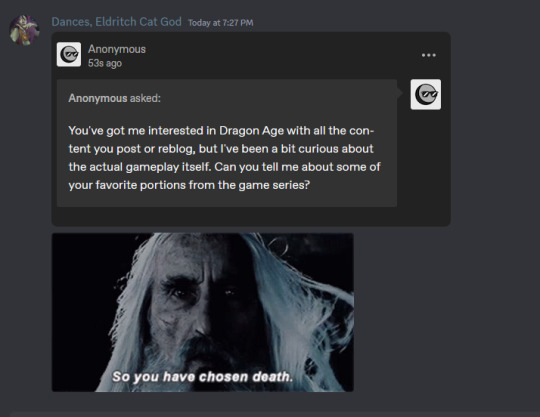
#girls will literally do anything to avoid writing their fics smh#just kidding i like getting these kinds of things#the dancer answers#“Dances what is your hyperfixation”#*broadly fucking gestures*#oh boy I'm glad you asked#long post#this is a fucking essay
4 notes
·
View notes
Text
You guys rlly don't realise how much knowledge is still not committed to the internet. I find books all the time with stuff that is impossible to find through a search engine- most people do not put their magnum opus research online for free and the more niche a skill is the less likely you are to have people who will leak those books online. (Nevermind all the books written prior to the internet that have knowledge that is not considered "relevant" enough to digitise).
Whenever people say that we r growing up with all the world's knowledge at our fingertips...it's not necessarily true. Is the amount of knowledge online potentially infinite? Yes. Is it all knowledge? No. You will be surprised at the niche things you can discover at a local archive or library.
#rambles#if you are a person who is into delicate skills#like lacemaking or printing or sewing#you will know fair well just how non expansive the knowledge online is in comparison to written guides from like the 50s#there was a time where at least one person in the household had to know a constructive skill#but in the modern day there is just less ans less demands for comprehensive guides#library propaganda#im stuck doing an essay rn but bc i have covid i cant go to the library and its totally fucked me#i want to source a lot of the stuff i read irl but i just cant go and get it and theres no online ver
75K notes
·
View notes
Text
btw did you guys see how the hannah arendt prize committee tried to revoke masha gessen's prize after gessen, a jewish journalist, wrote an essay about how zionists and zionist-sympathizing gentiles, particularly in germany, wield accusations of antisemitism to shut down anti-zionist jews... an essay in which they specifically quoted hannah arendt several times
#I think the committee relented and gave them the award after all but still... irony doesn't even seem like the right word for it...#the essay was good too but even when I was reading it was like masha baby you could've pushed the envelope a little farther. if you wanted.#and then the backlash happened and I was like jk I guess they pushed that fucking envelope alright!
6K notes
·
View notes
Text
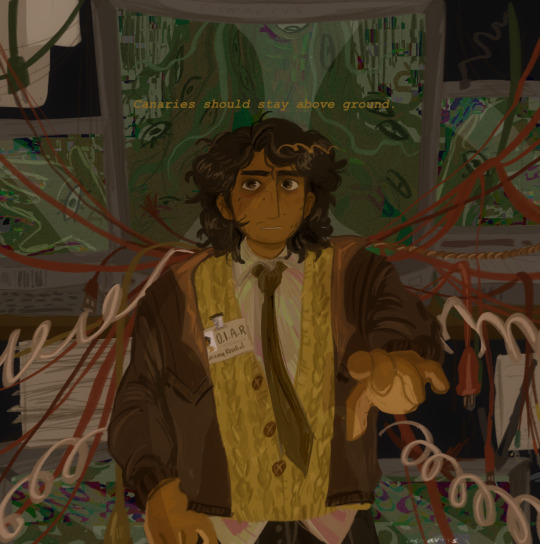
get this boy out of the magnus institute NOW
#cosm's art!!!!!#magnuspod#the magnus protocol fanart#the magnus protocol#samama khalid#jon sims#the wires behind him are supposed to look like canary wings#This is another reach piece#IM GONNA FAIL HISTORY I FUCKING DREW THIS INSTEAD OF DOING MY ESSAY IM GONNA DIE#but it's okay#Hashtag dropout
3K notes
·
View notes
Text


"I know what butch is. Butches are not beginner FTMs, except that sometimes they are, but it's not a continuum except when it is. Butch is not a trans identity unless the butch in question says it is, in which case it is, unless the tranny in question says it isn't, in which case it's not. There is no such thing as butch flight, no matter what the femmes or elders say, unless saying that invalidates the opinions of femmes in a sexist fashion or the opinions of elders in an ageist fashion. Or if they're right. But they are not, because butch and transgender are the same thing with different names, except that butch is not a trans identity, unless it is; see above."
-"I KNOW WHAT BUTCH IS", Butch is a Noun, Essays by S. Bear Bergman (2006)
#butch is a noun#s. bear bergman#lesbian#lesbianism#transgender#trans man#butch#butch lesbian#trans butch#transmasculine#gender stuff#trans lit#lesbian lit#this essay fucking rocks#lgbtq+ writing#lgbt writing
15K notes
·
View notes
Text
dichotomy of “nothing in the digital age is permanent, we are losing physicality and thus part of ourselves” vs. “everything in the digital age is permanent, everything you do is recorded and stored for later use against you or to exploit you”
#yeah i'm fucking normal about cyberpunk right now#sorry i get so ranty when i write essays lol#.txt
79K notes
·
View notes
Text
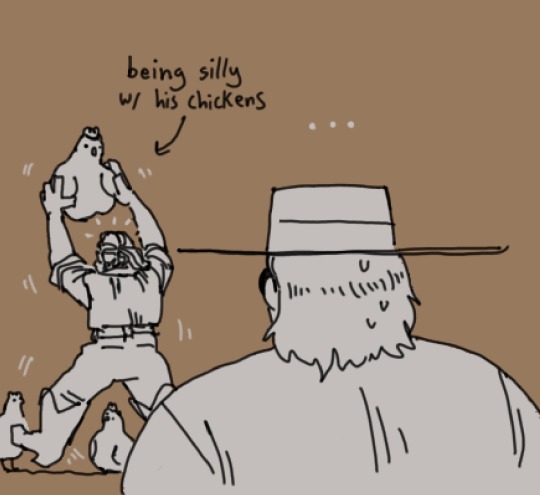
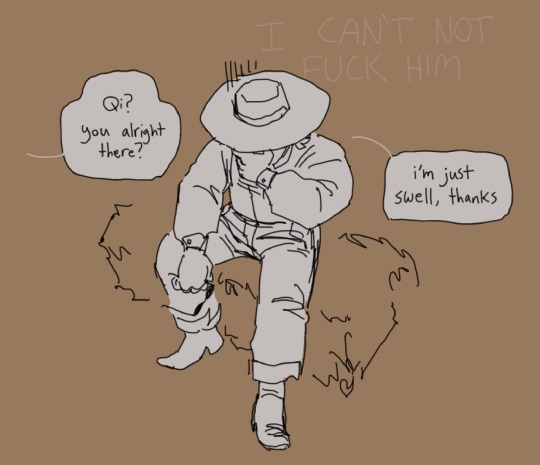
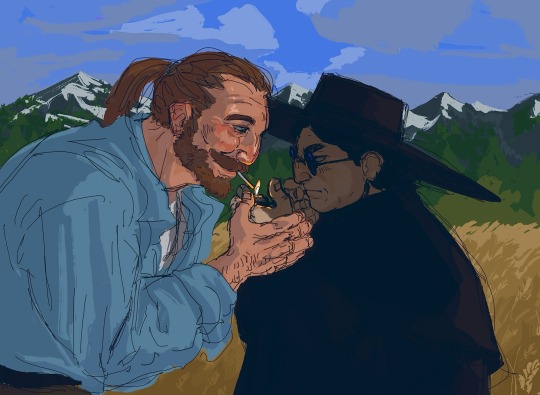
pelican town, ‘72
#stardew valley#stardew valley spoilers#sdv#sdv spoilers#grandpa#mister qi#mr. qi#idk how dates work in stardew universe im just bullshittin#i love qi’s huge fucking eyebrows you dont notice them at first but theyre there#(gives our collective grandpa a ponytail) i think he had one. whatever#’why isnt mister qi blue’ my hc is he is blue from long-term iridium supplementation#and was originally just a regular person#but also it’s nice to see ur fav be like a normal human color#if u read tag essays tho consider this:#qi discovers secret to immortality (consuming iridium in a specific manner)#wants to share discovery with his farmer (player’s grandpa) and in that way. they will have all the time in the world to build#a perfect farming/business empire whose legacy will last forever and ever and theyll be 2gether forever#but it turns out. like a lot of normal people would. his farmer does not want to live forever#and obv he doesn’t#in an attempt to try not to ever lose the thing that means more to him than anything else in the world. qi inadvertantly ensures he will#because his farmer is dead. and he’s going to live forever#but. it’s kind of ok. because he has infinite money and was able to figure out how to talk to his dead bf#and now YOU help them fulfill their joint goal of making the farm’s legacy last forever#smile. heart#sobbing
1K notes
·
View notes
Text
in the pilot jackie teases shauna abt her catholic phase and to that shauna responds that she liked the saints bc she thought they were so tragic. in the last ep of s1 during their fight the first insult shauna calls jackie is tragic. she calls her other things too but its so intresting that the first thing she thinks of is tragic. to me thats like a freudian slip. jackie was shaunas saint.
#in this essay i will#fuck jackieshauna#jackieshauna#jackieshauna come home the kids miss you#shauna shipman#jackie taylor#yellowjackets#yellowjackets text posts
1K notes
·
View notes
Text
on a real note that bit near the end of the video was genuinely haunting. hearing somerton talk about how gay writers are erased from history was one thing (with all the irony being that he stepped on the backs of numerous underpaid, underprivileged and uncredited queer writers to build his youtube channel) but when h revealed it wasn't even somerton's quote in the first place? the worst, most crushing sort of irony. how do you lament about the erasure of gay people and gay writers in history... whilst erasing a gay writer and taking his words as your own?
#it's genuinely unconscionable and its given me a lot to think about#i found somerton through his video essay on killing stalking#one of my favourite psychological horrors#i was overjoyed to find someone who seemed to recognise it for the dark character study of trauma and abuse that it was#and not a love story#now all i want to do is go back to that video and search up the phrases in google#to see who really wrote those words and phrases that got to me so deeply#fuck man . what a disappointment#james somerton#hbomberguy#veetxt
3K notes
·
View notes
Text
much in like the way a single dorito could kill a medieval peasant, a single episode of torchwood (2006) could kill a tiktok teen
#torchwood#just watched a video essay about commodification of representation particularly bisexuality#and just got reminded of how fucking good torchwood is in this area.#watch torchwood. i will not ask again.#doctor who
2K notes
·
View notes
Text
this whole james somerton thing is really amusing if you, like me, have legitimately never heard of the guy, have never been recommended his videos, and this is your first exposure to him at all. like holy shit did he say that nazis being hot is why americans enlisted during wwii? what the fuck is this smug clown on about and who allowed him to have recording equipment
#todd in the shadows#hbomberguy#i have an extra shield because i generally avoid video essays for the reasons todd and hbomb allude to#that too many present unverifiable info or conjecture or straight up opinions with tone of authority and severity#AND there are people who dub videos 'essays' despite lacking some necessary characteristics that would make them essays#like evidence and a FUCKING THESIS. it's not an essay just because it exceeds 40 minutes!#jenny nicholson does not make essays. she does (very entertaining!) casual deep dives. and she also has never pretended she makes essays#that's on the people who watch her
2K notes
·
View notes
Text
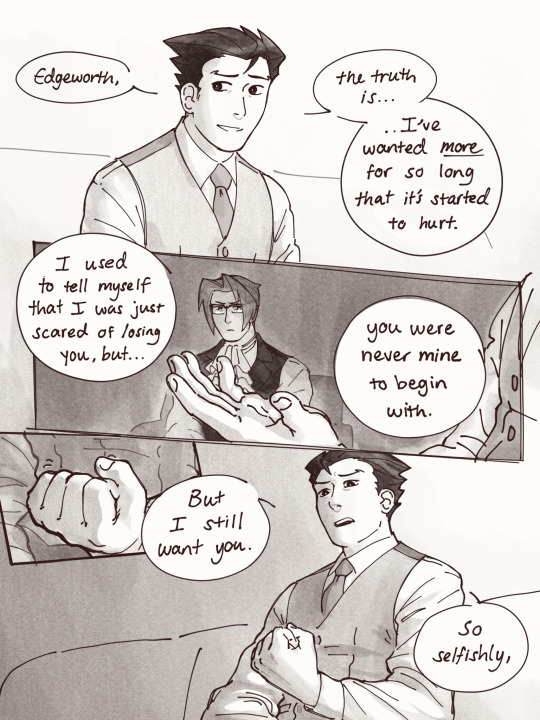

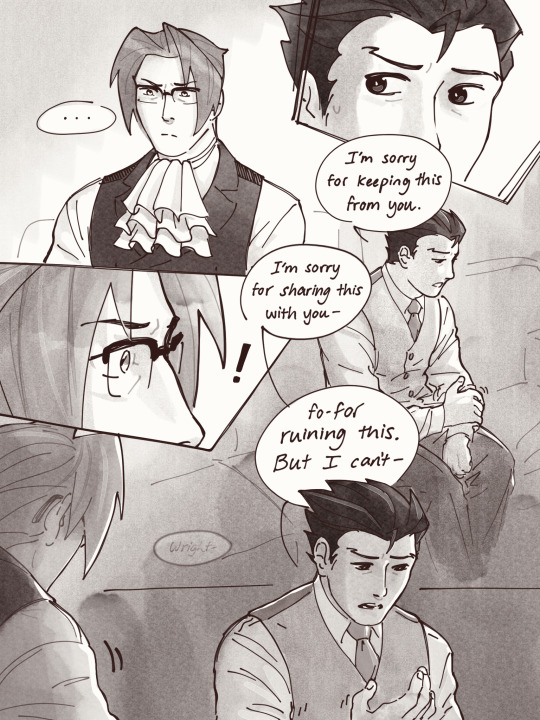
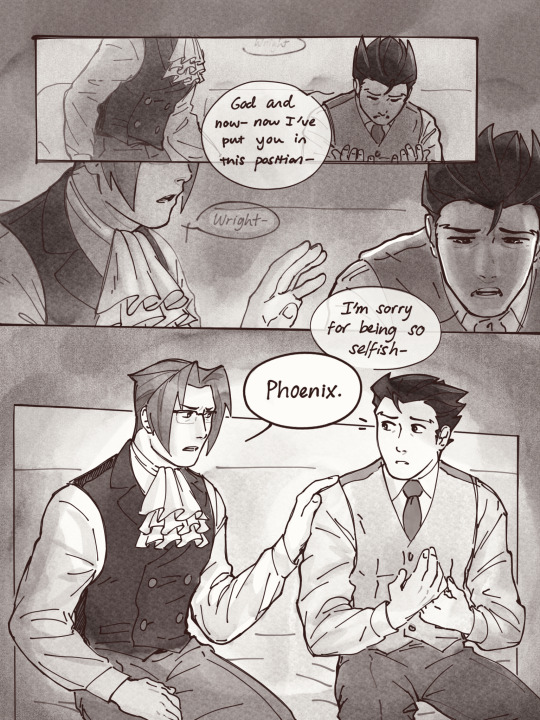
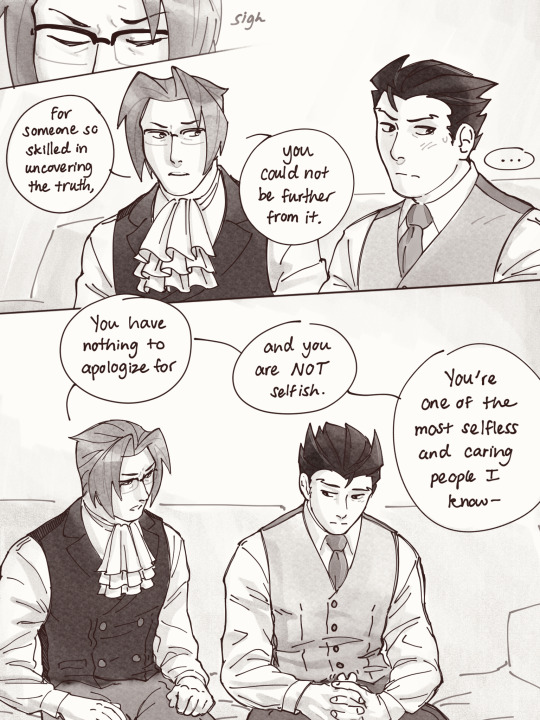
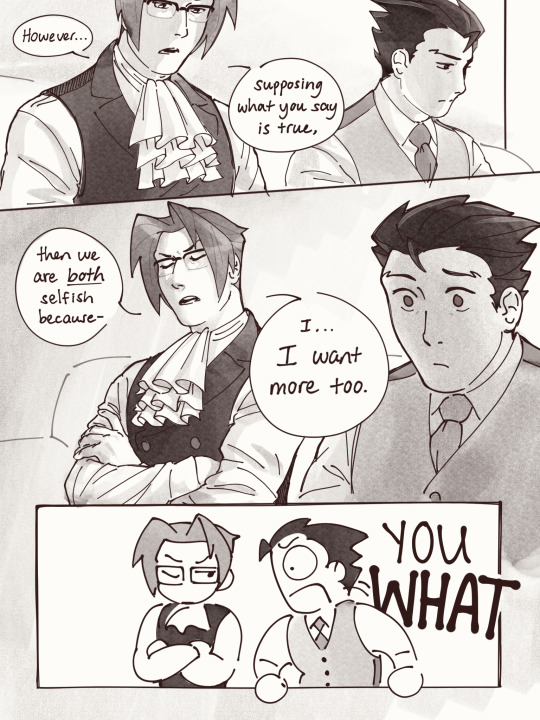
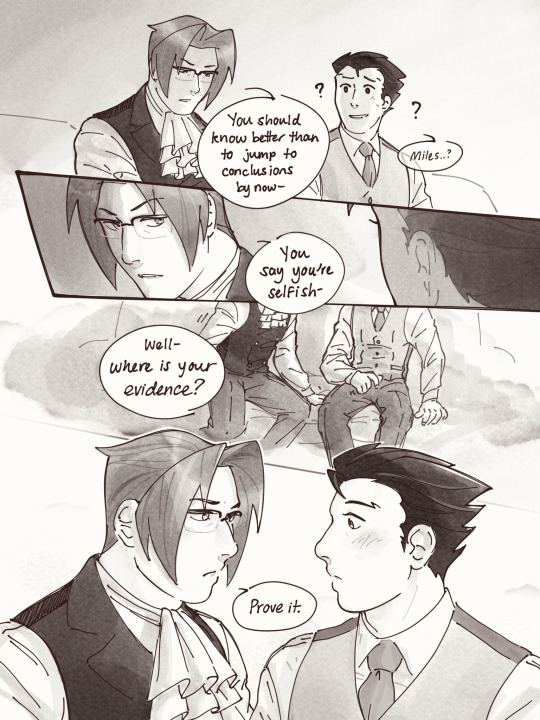
“Take my hand” pages 5-11
1 - day 2 - truth - 3
#nmweek23#narumitsu#wrightworth#phoenix wright#miles edgeworth#i spent all yesterday shading and lettering these your boy is so tired BUT IT WAS WORTH IT#in which i cram way too much into way too little and yet way too many pages for a single day#my sincerest apologies to them on their day but i will make it up to them i PROMISE#‘prove it’ you’ll NEVER GUESS what happens next :^))))) (<-guy who is extremely predictable)#phoenix is so strong because if miles looked at me like that i’d be going crazy and im like a known enemy of edgeworth#see you guys in like 5-7 business days on part 3 o7#fan art#aa#fan comic#rendevok#OH OH ALSO there’s like a whole fucking essay i could write about these pages esp wrt light and also The Hands but youll have to ask for it#just know that if you see something… there was probably a reason for it!#ok thats it fr this time
3K notes
·
View notes
Text
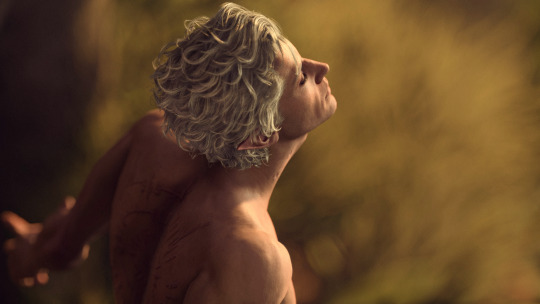
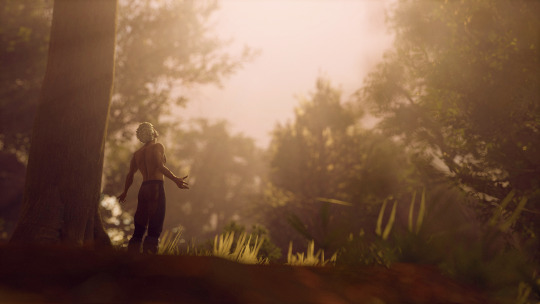
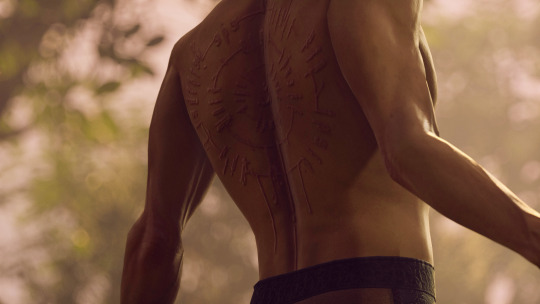
But whose heart would not take flight?
Betray the moon as acolyte
On first and fierce affirming sight
Of sunlight, sunlight, sunlight
#bg3#bg3 edit#bg3 screenshots#astarion#i have so many fucking FEELINGS about this scene#like the bathing in sunlight would be powerful enough#but it's freedom it's cleansing it's healing it's peace#in the context of what happened the previous night#he doesn't want to turn and look at the PC#his FACE when he has to#UGH#I could write essays#novels#epics
2K notes
·
View notes
Text
While you’re out arguing whether necromancers or illusionists are more evil, the evocation caster just set 15 people and various nearby inanimate objects on fire, which is a clear breach of Protocol III of The United Nations Convention on Certain Conventional Weapons, thus constituting a war crime. In this essay I will —
#kanny says things#this is mostly a joke#but if you think about it#most spells are kinda fucked up#like can you imagine the smell after a battle with a caster on your team?#like if it’s not force damage then it’s gonna have some Effects™#i wonder if spellcasters eventually become nose-blind to the smell#in this essay i will#d&d
18K notes
·
View notes